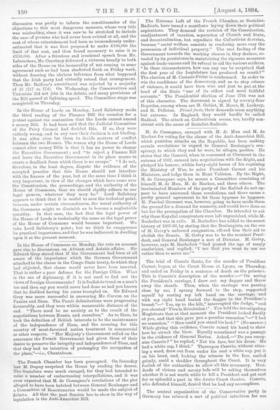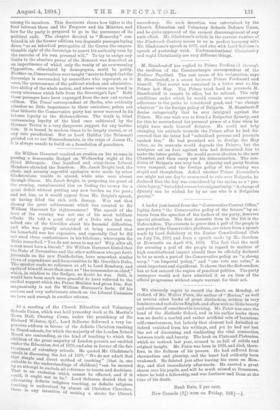The central organisation of the Conservative party in Germany has
reissued a sort of political catechism for use among its members. This document shows how bitter is the feud between them and the Emperor and his Minister, and tow far the party is prepared to go in the pursuance of its political ends. The chapter devoted to " Monarchy " con- tained in all the former editions two dogmatic passages laying -down "as an inherited prerogative of the Crown the unques- tionable right of the Sovereign to assert his authority even by the exercise of his own personal will." To try to assign any limits to the absolute power of the Monarch was described as an impertinence of which only the vanity of an overweening Opposition, stimulated by demagogues, could be guilty. Further on, Conservatives were taught " never to forget that the -Sovereign is surrounded by councillors who represent, as it were, the quintessence of the political wisdom and administra- tive ability of the whole nation, and whose voices are heard in every utterance which falls from the Sovereign's lips." Both these passages have been expunged from the new and revised -edition. The Times' correspondent at Berlin, who evidently attaches no little importance to these omissions, points out that hitherto the Conservative party has never wavered in its intense loyalty to the Hohenzollerns. The truth is, blind unreasoning loyalty of the kind once cultivated by the 'German Tories is a very dangerous support for any institu- tion. It is bound in modern times to be largely unreal, or at any rate paradoxical. But as Lord Halifax (the Trimmer) pointed out to our Nonconformists, in the reign of James II., at is always unsafe to build on a foundation of paradoxes.



































 Previous page
Previous page